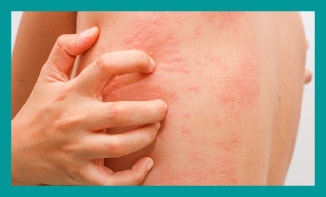Hives Treatment
 Guardian featured Harley Street IBS, Autoimmune & Skin Clinic addresses the underlying issues, not just the symptoms in Hives treatment.
Guardian featured Harley Street IBS, Autoimmune & Skin Clinic addresses the underlying issues, not just the symptoms in Hives treatment.
Hives Treatment: What is Hives or Urticaria?
Hives, also known as Urticaria, is an outbreak of swollen, pale red bumps or plaques (wheals) on the skin that appear suddenly — either as a result of the body’s reaction to certain allergens, or for other reasons.
Symptoms
- Raised itchy bumps, either red or skin-coloured
- “Blanching” (when pressed, the centre of a red hive turns white)
Hives usually cause itching but may also burn or sting. They can appear anywhere on the body, including the face, lips, tongue, throat, or ears. Hives vary in size (from a pencil eraser to a dinner plate) and may join together to form larger areas known as plaques. They can last for hours, or up to one day before fading.
Hives Triggers
- Some food (especially peanuts, eggs, nuts and shellfish)
- Medications, such as antibiotics (especially penicillin and sulfa), aspirin and ibuprofen
- Insect stings or bites
- Physical stimuli, such as pressure, cold, heat, exercise or sun exposure
- Latex
- Blood transfusions
- Bacterial infections, including urinary tract infections and strep throat
- Viral infections, including the common cold, infectious mononucleosis and hepatitis
- Pet dander
- Pollen
- Some plants, such as poison oak and poison ivy
Our Hives Treatment
The first step is to identify the root cause, or the imbalances, that are triggering symptoms. Collecting this information is essential to determine the course of treatment. Functional medicine tests will identify any root underlying causes and then a tailored treatment plan for treating urticaria will be implemented utilising non pharmaceutical medicine.
We also address any gut issues, which are often associated with this condition.
References
If you would like to book an appointment
Contact Deborah’s Medical Secretary for an appointment